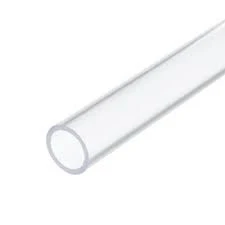ធ្នូ . 26, 2024 05:18 Back to list
perforated pvc pipe
Understanding Perforated PVC Pipe Applications and Benefits
Perforated PVC pipe is a specialized type of piping designed for a variety of drainage and irrigation applications. What sets this type of pipe apart is its unique construction, which includes evenly spaced holes or perforations along the length of the pipe. These perforations allow for the efficient flow of water while preventing clogging from sediment or debris. As a result, perforated PVC pipe is becoming increasingly popular in various fields such as agriculture, landscaping, and civil engineering.
Applications of Perforated PVC Pipe
One of the primary applications of perforated PVC pipe is in agricultural drainage systems. Farmers often rely on this type of pipe to manage excess water in their fields. By installing perforated pipes at strategic locations, excess water can drain away effectively, which helps prevent crop damage and promotes optimal growth conditions. The holes in the pipe allow water to enter while keeping larger soil particles out, thus minimizing clogging and maintaining a consistent flow.
In landscaping, perforated PVC pipe is frequently used in French drains, which are designed to redirect surface water and groundwater to prevent flooding in yards and gardens. The perforations in the pipe help to collect water that has accumulated, channeling it safely away from structures and thereby improving drainage and landscaping aesthetics.
Moreover, many construction projects incorporate perforated PVC pipe for managing stormwater runoff. This is particularly relevant in urban areas where impervious surfaces can lead to significant water accumulation and flooding. By installing perforated pipe systems beneath pavement or soil, stormwater can be effectively captured and diverted, thus reducing the risk of flooding and erosion.
perforated pvc pipe

Benefits of Perforated PVC Pipe
The use of perforated PVC pipe comes with a number of advantages. First and foremost is its lightweight nature, which makes it easy to handle and install compared to traditional materials like clay or concrete. This can lead to reduced labor costs and quicker project completion times.
Another significant benefit is the durability and longevity of PVC material. Unlike metal pipes that may rust or corrode over time, PVC is resistant to many chemicals and environmental factors, allowing it to maintain structural integrity for years with minimal maintenance.
Additionally, perforated PVC pipe is cost-effective. Due to its efficiency in drainage applications, it can reduce the need for extensive drainage systems, saving both time and financial resources in the long term. The smooth interior surface of PVC also helps to reduce friction, allowing for free-flowing drainage, which is essential in avoiding stagnation that could lead to unpleasant odors or further drainage issues.
Conclusion
In summary, perforated PVC pipe is a versatile and essential component in modern drainage and irrigation systems. Its various applications in agriculture, landscaping, and stormwater management highlight its importance in improving efficiency and performance in water management. The combination of its lightweight, durable nature and cost-effectiveness makes this material an ideal choice for both residential and commercial projects. As water management continues to be a critical issue globally, the use of innovative solutions like perforated PVC pipe will play a crucial role in achieving effective drainage systems and sustainable agricultural practices.
-
High-Quality HDPE Sheet | Durable Plastic Panels
NewsAug.06,2025
-
High-Precision PVC Rigid Sheets for Vacuum Forming | AI-Optimized
NewsAug.05,2025
-
Durable PVC-M Water Supply Pipes | 60-Year Life
NewsAug.04,2025
-
Premium HDPE Water Supply Pipes: Durable & Leak-Proof
NewsAug.03,2025
-
Premium PVC-M Water Supply Pipe - Durable & Efficient
NewsAug.02,2025
-
HDPE Drainage & Irrigation Pipe - Durable, Efficient Solutions
NewsAug.01,2025

